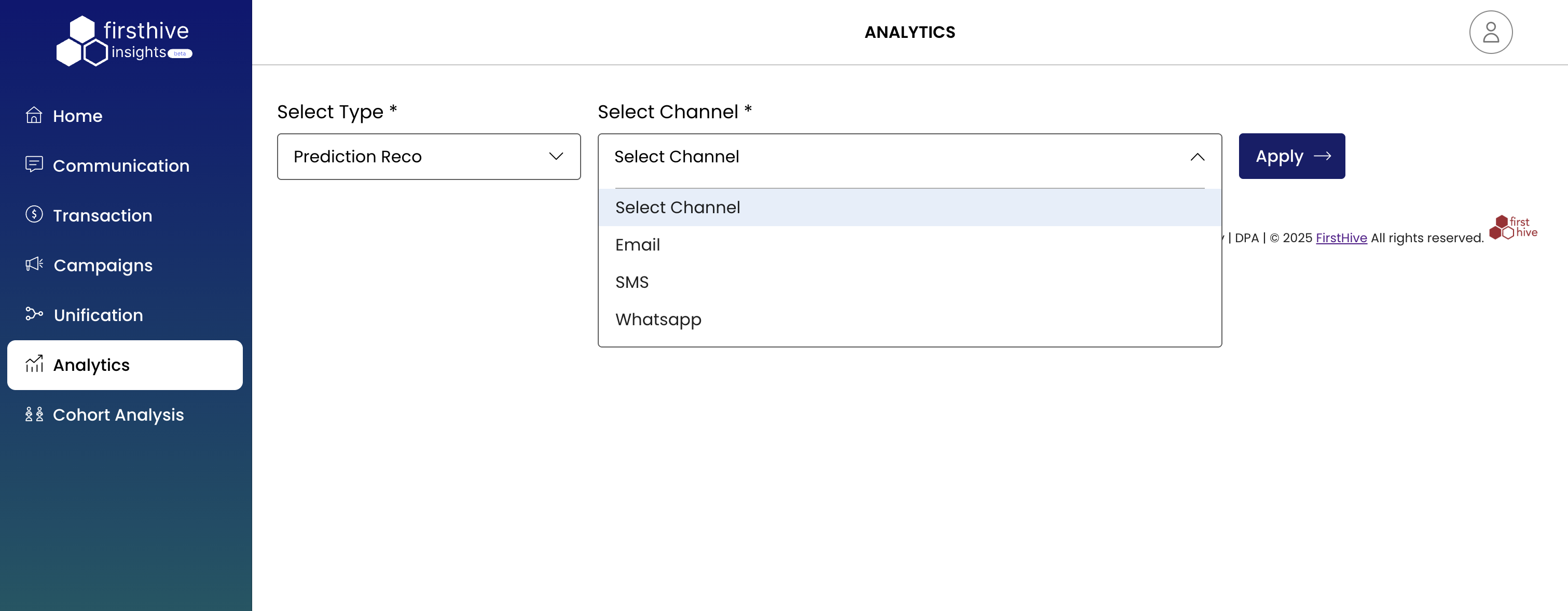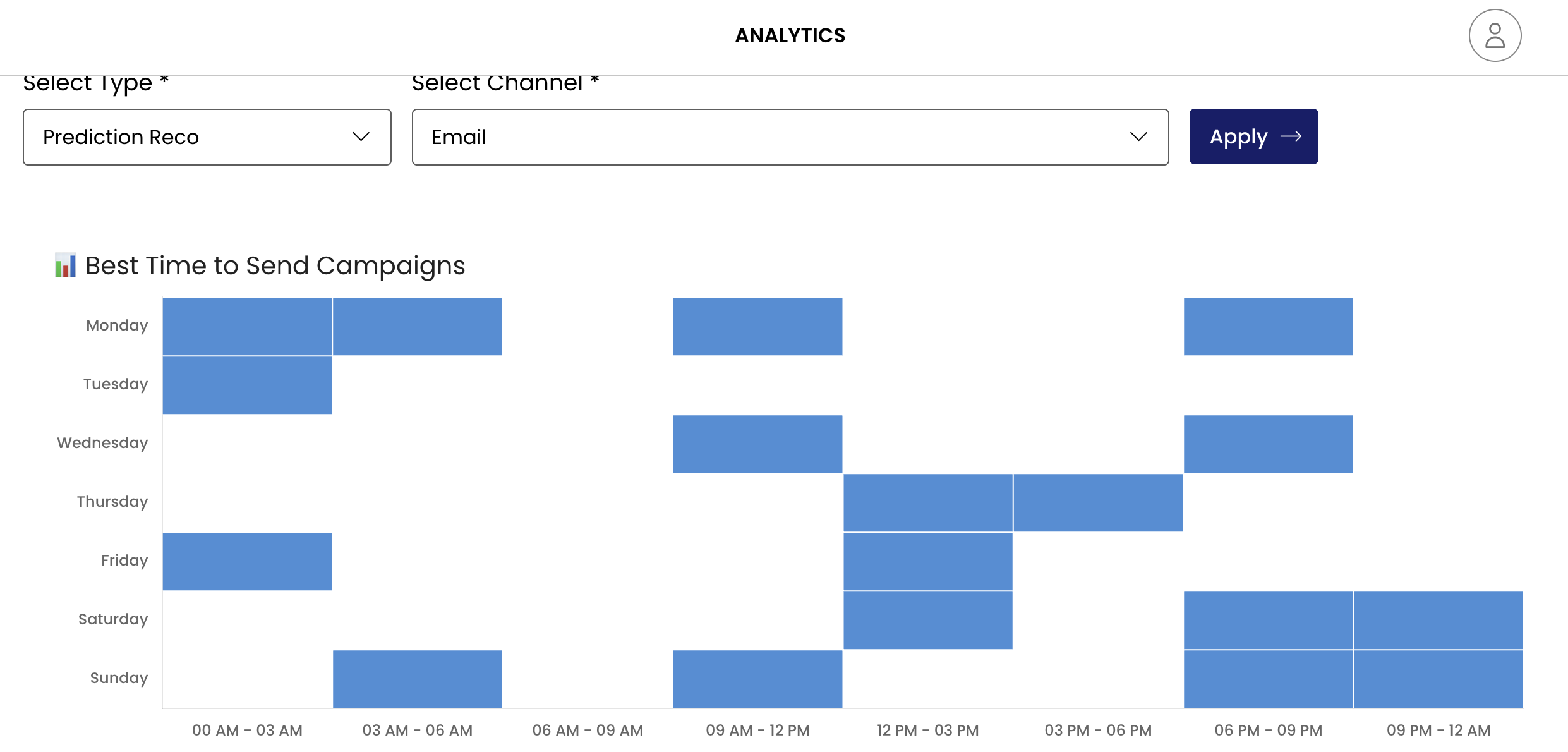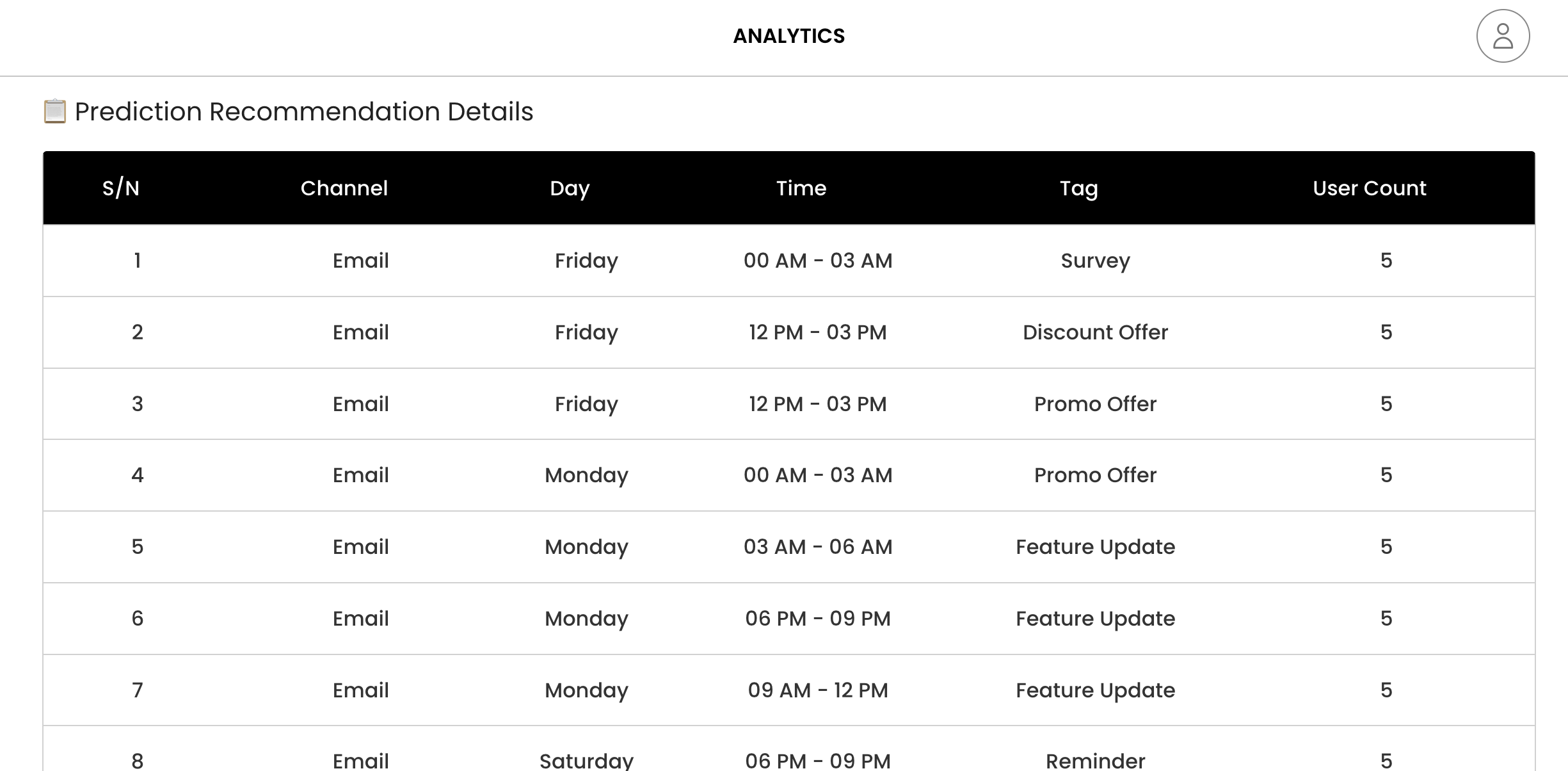Channel Affinity - Predictive Recommendations
FirstHive CDP’s Channel Preference Predictive Analytics is a comprehensive analytics module that helps marketers optimize campaign delivery by predicting the best channels, timing, and content tags for customer engagement. The system leverages machine learning algorithms to analyze customer behavior patterns and provide data-driven recommendations for campaign optimization.
Key Features
Prediction Recommendation Engine
The system provides intelligent recommendations based on historical customer interaction data across multiple communication channels.
Available Prediction Types:
- Prediction Reco: Main predictive recommendation engine that analyzes customer preferences
Supported Channels:
- SMS

Best Time to Send Campaigns Analysis
Visual Representation
The module displays campaign timing recommendations through an intuitive heatmap visualization showing:
- Days of Week: Monday through Sunday
- Time Slots: 24-hour period divided into 3-hour intervals
- 00 AM - 03 AM
- 03 AM - 06 AM
- 06 AM - 09 AM
- 09 AM - 12 PM
- 12 PM - 03 PM
- 03 PM - 06 PM
- 06 PM - 09 PM
- 09 PM - 12 AM
Interpretation
- Blue Intensity: Represents engagement levels
- Darker Blue: Higher engagement rates
- Lighter Blue: Lower engagement rates
- White/Empty: No significant engagement data

Best Tags for Each Day Analysis
Tag Categories
The system analyzes performance across various campaign tag types:
- Survey: Customer feedback and research campaigns
- Discount Offer: Promotional campaigns with price reductions
- Promo Offer: General promotional content
- Feature Update: Product or service update notifications
- Reminder: Follow-up and reminder communications
- Newsletter: Regular content and news updates

Visual Analytics
- Stacked Bar Chart: Shows tag performance distribution by day
- Color Coding: Each tag type has a distinct color for easy identification
- Performance Metrics: Y-axis represents engagement volume (0-16 scale)
Prediction Recommendation Details Table
Data Structure
The detailed recommendations table provides granular insights with the following columns:
| Column | Description | Purpose |
|---|---|---|
| S/N | Serial Number | Record identification |
| Channel | Communication channel | Platform optimization |
| Day | Day of the week | Timing optimization |
| Time | Optimal time slot | Precise timing guidance |
| Tag | Content category | Content optimization |
| User Count | Predicted audience size | Volume estimation |
Sample Recommendations
Based on the analytics, typical recommendations include:
- Early Morning Surveys: Friday 00 AM - 03 AM for survey campaigns
- Afternoon Promotions: Friday 12 PM - 03 PM for discount and promo offers
- Feature Updates: Monday morning slots (00 AM - 06 AM and 06 PM - 09 PM)

Key Insights and Patterns
Optimal Timing Patterns
- Friday Focus: High engagement rates on Fridays, particularly for promotional content
- Monday Momentum: Strong performance for feature updates and promotional offers
- Time Slot Performance:
- Early morning (00 AM - 03 AM): Effective for surveys
- Afternoon (12 PM - 03 PM): Best for promotional offers
- Evening (06 PM - 09 PM): Good for feature updates
Channel-Specific Insights
- Email Dominance: All visible recommendations focus on email channel
- Consistent User Count: Uniform audience size (5 users) across recommendations suggests segmented targeting
Content Strategy Recommendations
- Survey Campaigns: Deploy during off-peak hours for better response rates
- Promotional Content: Schedule during prime engagement periods
- Feature Updates: Distribute across multiple time slots for broader reach
Usage Guidelines
For Campaign Managers
- Pre-Campaign Planning: Use timing heatmaps to schedule campaigns
- Content Selection: Reference tag performance data for content planning
- Channel Selection: Leverage channel-specific insights for medium optimization
For Data Analysts
- Performance Tracking: Monitor prediction accuracy against actual results
- Model Optimization: Use insights to refine predictive algorithms
- Trend Analysis: Identify seasonal or periodic engagement patterns
Technical Specifications
System Requirements
- Browser Compatibility: Modern web browsers with JavaScript support
- Data Processing: Real-time analytics processing
- Visualization Engine: Interactive charts and heatmaps
Data Sources
- Historical campaign performance data
- Customer engagement metrics
- Channel-specific interaction patterns
- Time-based behavior analysis
Best Practices
Implementation
- Regular Review: Weekly analysis of recommendation performance
- A/B Testing: Validate predictions through controlled testing
- Continuous Optimization: Adjust strategies based on results
Data Quality
- Sufficient Historical Data: Ensure adequate data volume for accurate predictions
- Clean Data Sets: Maintain data hygiene for reliable insights
- Regular Updates: Keep prediction models current with fresh data
Integration Points
Campaign Management
- Direct integration with campaign scheduling tools
- Automated recommendation application
- Performance feedback loops
Customer Segmentation
- Audience targeting based on preference predictions
- Personalized timing optimization
- Channel preference mapping
Limitations and Considerations
Model Accuracy
- Predictions based on historical patterns may not account for external factors
- Seasonal variations require continuous model adjustment
- Small sample sizes may affect recommendation reliability
Channel Coverage
- Current focus on email, SMS, and WhatsApp
- Limited social media integration
- No cross-channel journey optimization
Future Enhancements - I suggest not adding this section
Planned Features
- Multi-channel Journey Mapping: Cross-channel preference analysis
- Real-time Optimization: Dynamic recommendation adjustments
- Advanced Segmentation: Persona-based timing recommendations
- Integration Expansion: Additional communication channels
Analytics Improvements
- Predictive Accuracy Metrics: Model performance tracking
- Competitive Benchmarking: Industry comparison features
- Custom KPI Definition: User-defined success metrics
